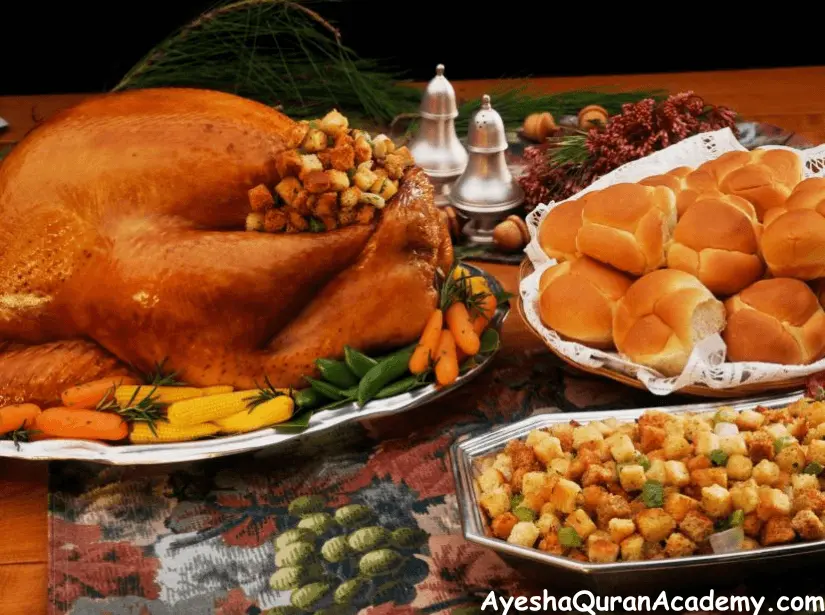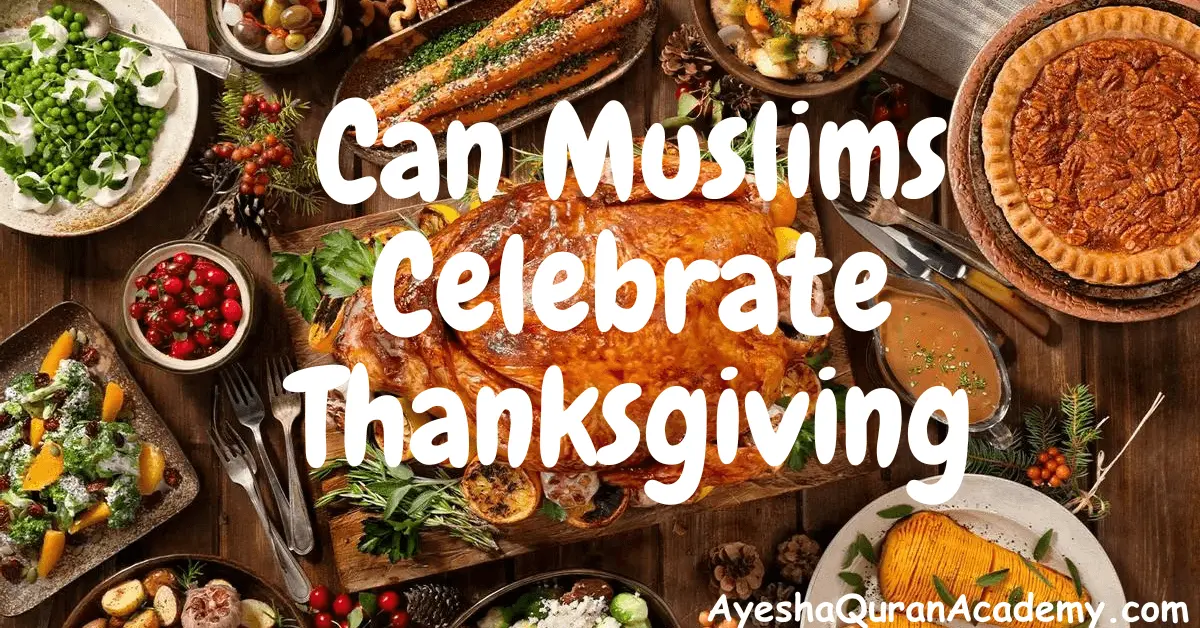Thanksgiving is a beloved holiday, characterized by gatherings of family and friends, feasting delicious food, and expressing gratitude for life’s blessings. However, for Muslim individuals and families, there might be some questions about whether they can participate in this cultural celebration while staying true to their faith.
In this comprehensive article, we will delve into the topic, can Muslim celebrate Thanksgiving. We will explore the cultural and religious aspects, address common questions, and provide guidance on how Muslims can enjoy this holiday while respecting their beliefs.
Thanksgiving is a widely celebrated holiday in the United States and Canada. It typically falls on the fourth Thursday of November in the United States and the second Monday of October in Canada.
This holiday has historical, cultural, and social significance, and it is a time for families and friends to come together, express gratitude, and enjoy a festive meal.
Can Muslims Celebrate Thanksgiving?
The intention behind an action is extremely important in Islam. There is no religious problem with a Muslim participating in Thanksgiving festivities in order to express thankfulness to Allah for their blessings. However, if the intention is to celebrate it as a religious holiday or to engage in actions that go against Islamic beliefs, it may become problematic.
Thanksgiving, as a cultural holiday centered around expressing gratitude, does not inherently conflict with Islamic principles. Indeed, Islam urges its followers to express gratitude for the blessings they receive.
However, whether Muslims can celebrate Thanksgiving is a matter of perspective and intention.
The Cultural Perspective
Thanksgiving is an opportunity for people of all backgrounds to come together and celebrate their shared sense of gratitude. Many Muslims, especially those living in multicultural societies, embrace Thanksgiving as a time to strengthen bonds with friends and neighbors and to promote goodwill.
The Religious Perspective
From a religious perspective, there is no specific prohibition against Muslims participating in Thanksgiving, as long as they uphold certain principles. These principles include:
- Intent: In Islam, the intention behind an action holds great significance. If a Muslim chooses to partake in Thanksgiving activities with the genuine intention of expressing gratitude to Allah for their blessings, there is no inherent religious issue with this. In fact, such an intention aligns with Islamic teachings.
- Islamic Values: It is essential for Muslims to ensure that their participation in Thanksgiving festivities is in line with Islamic values. And it does not involve activities or behaviors that go against their faith. For example, excessive drinking, inappropriate behavior, or engaging in activities contrary to Islamic principles should be avoided.
- Halal Dietary Considerations: When participating in Thanksgiving meals, Muslims should ensure that they prepare the food in accordance with Islamic dietary laws. This means that the food, particularly the turkey, should be halal. This means it is slaughtered and prepared in the prescribed Islamic manner.
Islamic Scholars’ Views
Islamic scholars‘ opinions on celebrating Thanksgiving can vary. Some may view it as a harmless cultural celebration that promotes positive values like gratitude and unity. Others may caution against certain aspects of the holiday that they believe contradict Islamic teachings. Such as excessive consumption or participation in activities that compromise one’s faith.
Ultimately, Muslims should only observe two holidays in Islam: Eid al-Fitr and Eid al-Adha. “Allah has given you better than those non-believers’ festivals: Eid-ul-Adha and Eid-ul-Fitr,” stated Prophet Mohammed (PBUH).
History of Thanksgiving
The origins of Thanksgiving trace back to the early 17th century when Pilgrims from England arrived in North America aboard the Mayflower. They faced a harsh winter and challenging conditions.
With the help of Native Americans, particularly the Wampanoag tribe, they learned to cultivate crops and adapt to their new environment.
In 1621, the Pilgrims and Wampanoag Indians came together for a three-day feast to celebrate a successful harvest. This event is often considered the first Thanksgiving. However, Thanksgiving did not become an annual holiday until much later.

Thanksgiving Traditions:
- Feasting: Firstly, Thanksgiving is synonymous with a grand feast. Roast turkey is the centerpiece of the meal, accompanied by stuffing, mashed potatoes, gravy, cranberry sauce, and various side dishes. Pumpkin pie and pecan pie are popular desserts.
- Parades: In the United States, the Macy’s Thanksgiving Day Parade in New York City is a famous tradition. It features large balloons, floats, marching bands, and performances.
- Football: Many people watch American football games on Thanksgiving. It has become a tradition for some families to play touch football in their yards.
- Thanksgiving Pardoning: The President of the United States traditionally pardons a turkey, sparing it from becoming Thanksgiving dinner.
- Volunteering: Finally, Some people choose to spend Thanksgiving volunteering at shelters, food banks, or community events to help those in need.
Thanksgiving in Canada:
In Canada, Thanksgiving has similar themes of gratitude and family gatherings. It is celebrated on the second Monday in October. The traditional Thanksgiving meal often includes turkey, stuffing, and pumpkin pie.
Modern Significance:
While Thanksgiving has historical roots, it has evolved into a holiday that transcends its origins. It is a time for people to reflect on their blessings, spend quality time with loved ones, and express gratitude for the good things in their lives. Furthermore, It promotes a sense of community and togetherness.
Cultural Diversity:
Thanksgiving celebrations vary from family to family and region to region. Some incorporate cultural and regional dishes into their feasts, reflecting the diversity of the population. It is also celebrated by people of various religious and cultural backgrounds, making it a unifying holiday.
Conclusion
In conclusion, Muslims can celebrate Thanksgiving in a manner that aligns with their faith and values. It is essential to maintain a clear intention of expressing gratitude to Allah and to avoid any activities that go against Islamic principles.
Thanksgiving can be an opportunity for Muslims to engage with their communities, strengthen relationships, and embody the spirit of gratitude that is encouraged in Islam.
FAQs
Ultimately, Muslims should only observe two holidays in Islam: Eid al-Fitr and Eid al-Adha. “Allah has given you better than those non-believers’ festivals: Eid-ul-Adha and Eid-ul-Fitr,” stated Prophet Mohammed (PBUH).
Muslims can attend Thanksgiving parties and gatherings with the intention of promoting goodwill and expressing gratitude. It is essential to avoid any activities or behaviors that go against Islamic principles, such as excessive drinking or inappropriate behavior.
Yes, Muslims can enjoy turkey on Thanksgiving, as long as they prepare it in accordance with Islamic dietary laws. They should ensure it is halal, meaning they should slaughter and prepare it in the prescribed Islamic manner.


